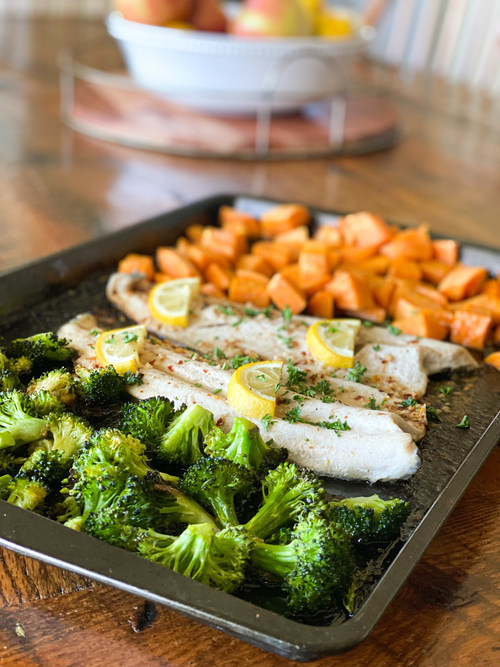#TastyTidbits Mood-Boosting Foods, Like Seafood, Help Address Rising Mental Health Concerns
Mental health has become a major public health concern, and there is growing acceptance to talk about it and find ways to address it. These past two years have been very hard for all of us in some way and conversations around self-care and mood-boosting foods are trends across media and social platforms. Seafood has health benefits that address anxiety and depression, according to data from Seafood Nutrition Partnership. In fact, the American Psychiatric Association endorsed the fatty acids in fish as an effective part of depression treatment.
This sheet pan fish meal is so simple for a delicious and quick, weeknight dinner - and is full of brain-boosting omega-3s.
What are Mood-Boosting Foods?
When we are depressed or anxious, we naturally resist self-care, including preparing and eating nutritious food. But good nutrition is more important than ever for those suffering from depression. Research shows that our daily food choices influence our mental health.
"How you nourish your body impacts your health and how you feel," says registered dietitian Jessica Miller. "Depression, like many chronic diseases we face, is tied to inflammation in our body - that puffiness we often feel is happening even at a cell level, and it severely impacts our health. The American diet is filled with foods that negatively impact how our brain works, but many delicious foods are anti-inflammatory and can reverse the damage, such as fish and shellfish."
Seafood Is Brain Food
Fish is like a multivitamin for your brain. Fish is more than just an excellent source of lean protein and essential omega-3s, it provides other vitamins and minerals important for mental health. The nutrients that tend to be low in people who are depressed – vitamin D, magnesium, and zinc – are found in fish.
Over the past 20 years, dozens of studies evaluating more than 20,000 cases of depression have shown eating 2-3 servings of fish per week and/or consuming omega-3 fish oil supplements significantly reduces risk for major depression. Here is a resource on how Fish is Brain Food.
For those struggling with mental health, more resources are available at the National Alliance on Mental Illness website, or contact their hotline 1-800-950-NAMI (6264).
"Trout is one of the best sources of mood-boosting omega-3s, and it is delicious!" says Miller, who created this sheet pan trout meal her family loves.
The recipe calls for trout, but you can substitute any medium-to-thick filet such as salmon, snapper or cod. For thin filets such as tilapia or flounder, or for shrimp, add the seafood to the pan five minutes after starting the vegetables.
Ingredients
1 lemon
1.5–2 lbs. trout filet
4 Tablespoons butter
4 cloves garlic, minced
1/4 tsp. red pepper flakes
1/2 tsp. salt
Ground black pepper to taste
2-3 cups of your favorite vegetables, such as sweet potatoes and broccoli
1/4 cup fresh chopped parsley
Instructions
Preheat oven to 375 degrees F.
Juice half the lemon. Cut the remaining half into 4-5 lemon slices.
In a small skillet, add butter, garlic, red pepper flakes, salt and pepper, and sauté, stirring frequently, to melt the butter. (This could be done in the microwave if you want.) Remove skillet from heat. Stir in reserved lemon juice.
Next, oil a large sheet pan. Place trout filet on pan. Add veggies to the pan.
Pour butter mixture over fish and vegetables. Use a pastry brush to rub the butter mixture into the fish. Place lemon slices across the trout and bake for about 15 minutes until cooked through.
Top cooked trout with chopped parsley. Serve immediately.









































































































